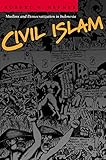Civil Islam : Muslims and Democratization in Indonesia / Robert W. Hefner.
Material type: TextSeries: Princeton Studies in Muslim Politics ; 40Publisher: Princeton, NJ : Princeton University Press, [2011]Copyright date: ©2000Edition: Core TextbookDescription: 1 online resource (312 p.)Content type:
TextSeries: Princeton Studies in Muslim Politics ; 40Publisher: Princeton, NJ : Princeton University Press, [2011]Copyright date: ©2000Edition: Core TextbookDescription: 1 online resource (312 p.)Content type: - 9780691050478
- 9781400823871
- 322/.1/09598
- BP63.I5H44 2000
- online - DeGruyter
- Issued also in print.
| Item type | Current library | Call number | URL | Status | Notes | Barcode | |
|---|---|---|---|---|---|---|---|
 eBook
eBook
|
Biblioteca "Angelicum" Pont. Univ. S.Tommaso d'Aquino Nuvola online | online - DeGruyter (Browse shelf(Opens below)) | Online access | Not for loan (Accesso limitato) | Accesso per gli utenti autorizzati / Access for authorized users | (dgr)9781400823871 |
Frontmatter -- CONTENTS -- FOREWORD -- PREFACE -- ACKNOWLEDGMENTS -- ABBREVIATIONS -- Chapter One. DEMOCRATIZATION IN AN AGE OF RELIGIOUS REVITALIZATION -- Chapter Two. CIVIL PRECEDENCE -- Chapter Three. CONTESTS OF NATION -- Chapter Four. AMBIVALENT ALLIANCES: RELIGION AND POLITICS IN THE EARLY NEW ORDER -- Chapter Five. THE MODERNIST TRAVAIL -- Chapter Six. ISLAM DEFERRED: REGIMIST ISLAM AND THE STRUGGLE FOR THE MIDDLE CLASS -- Chapter Seven. UNCIVIL STATE: MUSLIMS AND VIOLENCE IN SOEHARTO'S FALL -- Chapter Eight. CONCLUSION: MUSLIM POLITICS, GLOBAL MODERNITY -- NOTES -- INDEX
restricted access online access with authorization star
http://purl.org/coar/access_right/c_16ec
Civil Islam tells the story of Islam and democratization in Indonesia, the world's largest Muslim nation. Challenging stereotypes of Islam as antagonistic to democracy, this study of courage and reformation in the face of state terror suggests possibilities for democracy in the Muslim world and beyond. Democratic in the early 1950s and with rich precedents for tolerance and civility, Indonesia succumbed to violence. In 1965, Muslim parties were drawn into the slaughter of half a million communists. In the aftermath of this bloodshed, a "New Order" regime came to power, suppressing democratic forces and instituting dictatorial controls that held for decades. Yet from this maelstrom of violence, repressed by the state and denounced by conservative Muslims, an Islamic democracy movement emerged, strengthened, and played a central role in the 1998 overthrow of the Soeharto regime. In 1999, Muslim leader Abdurrahman Wahid was elected President of a reformist, civilian government. In explaining how this achievement was possible, Robert Hefner emphasizes the importance of civil institutions and public civility, but argues that neither democracy nor civil society is possible without a civilized state. Against portrayals of Islam as inherently antipluralist and undemocratic, he shows that Indonesia's Islamic reform movement repudiated the goal of an Islamic state, mobilized religiously ecumenical support, promoted women's rights, and championed democratic ideals. This broadly interdisciplinary and timely work heightens our awareness of democracy's necessary pluralism, and places Indonesia at the center of our efforts to understand what makes democracy work.
Issued also in print.
Mode of access: Internet via World Wide Web.
In English.
Description based on online resource; title from PDF title page (publisher's Web site, viewed 29. Jul 2021)


